Let’s have a virtual Emacs conference in August – help me make it happen!
Posted: - Modified: | conference, connecting, emacsWhy August? It's an arbitrary target, although it tickles my brain to think about celebrating my 32nd birthday with awesome people sharing awesome ideas. (Incidentally, I'll also reach the point of having been using Emacs for about half my life – doubly neat!)
Anyway. I think it would be great to have some kind of knowledge-swapping thing. Since I'm not particularly keen on travelling, not everyone can make it out to Canada, and it's hard to make awesome in-person conference recordings anyway, maybe a virtual conference would be a great bet. I'm willing to spend what I would have paid for airfare on things like organization, speaker honoraria, and other good things.
I enjoyed the Emacs Conference in 2013, and I think we should figure out how to have these kinds of get-togethers more often. Emacs Chats and Emacs Hangouts are tiny steps in that direction, and I'd appreciate help in making this and many other community-ish things even better. =)
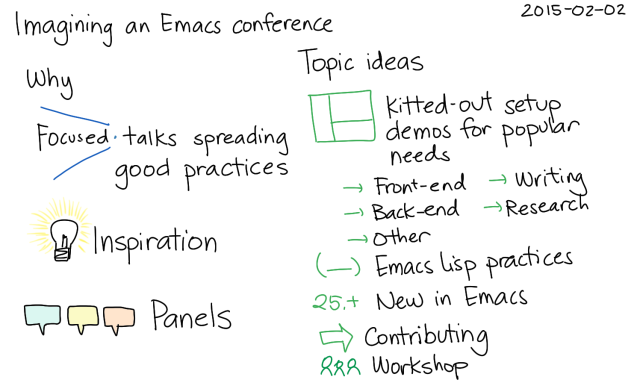
So here's what I imagine a virtual Emacs conference might be like. People volunteer, and somehow we organize a schedule of fascinating talks. This could be a full day, or maybe we'd spread it out over a couple of half-days (maybe even scheduled for different timezones so that everyone has something they can interact with life). We use Google Hangout on Air or a similar platform that can stream and automatically record. There's the speaker with slides and screensharing, and there's a moderator who can pick up questions from IRC and Google Hangout in order to ask them out loud. We might even be able to pull off panel discussions. Afterwards, there's a playlist and a webpage with all the videos/MP3s/OGGs, and people can share their notes/discussions/follow-ups.
All this is immensely doable with the technology we have today. For free, even. Anyway, the technology should be okay.
What about topics? Here's what I'm particularly curious about:
- New features in Emacs 25 (and beyond)
- Demos, workflows, and setup tips for popular toolsets/needs (ex: awesome setups for Clojure/CL, Rails, Javascript, C++, Java, writing, research)
- Fascinating uses of Emacs
- Good practices for Emacs Lisp: automated testing, performance, reliability, coding style/idioms (maybe even workshops along these lines)
- Demystifying cool stuff: how core modules work, how to contribute to Emacs
- A hackathon: get package.el headers on everything! fix bugs! make improvements! document!
- Emacs microhabits, learning
- Workshops: intermediate/advanced use of Org Mode, Calc, ESS, and other powerful packages
- Emacs community-building and sharing
And people can suggest other topics, too. =) Maybe we can even figure out some kind of unconference setup: people suggesting topics they can share, quickly voting on what they're interested in, and breaking up into separate "rooms" to share/discuss.
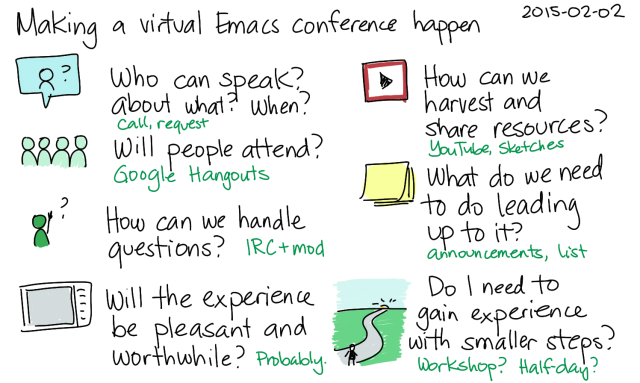
An Emacs conference would be awesome. Here are my (pitiful) excuses for why I haven't figured out how to organize one yet, and things I want to figure out (especially with people's help):
- Who might be interested in speaking? How does one go about organizing speakers, schedules, topics, tech, etc? I'm still slowly getting the hang of reaching out to people and inviting them to Emacs Chats.
- Will people show up and ask questions? Part of me is worried that I'll pick entirely the wrong date/time/topics and there'll be awkward silence.
- How can we handle questions? IRC, probably, so that people can chat about stuff too. I think I'm pretty comfortable at keeping an eye on stuff and repeating people's questions. Or maybe people can join the Emacs Hangout if we can get the flow to be smooth?
- Will the experience be pleasant and worthwhile? Maybe not as goosebump-inducingly awesome as being in a room with 80+ other Emacs geeks, but I think it will be worthwhile.
- How can we harvest and share resources? Hangouts on Air will put videos on Youtube automatically, so that'll be taken care of.
- What would we need to do leading up to it? Something about a mailing list, and a webpage, and lots and lots of coordination.
- Do I need to gain experience/confidence with smaller steps? Or maybe find some accomplices?
Of course, if someone wants to organize an in-person one, that's cool too. Especially in Toronto. That would be awesome. =) (Although I might be able to get to New York or similar places too…)
My evil plans for a conference like this include:
- Getting cool stuff out of people's heads/fingers/configs and into a form that other people can look at, learn from, and link to
- Ditto for good practices that can help us develop better code (performance)
- Discovering resources and tips we might not have found out about otherwise
- Sparking more conversations and follow-ups
- Spurring people to create and share more resources
What could help the Emacs community learn even faster?
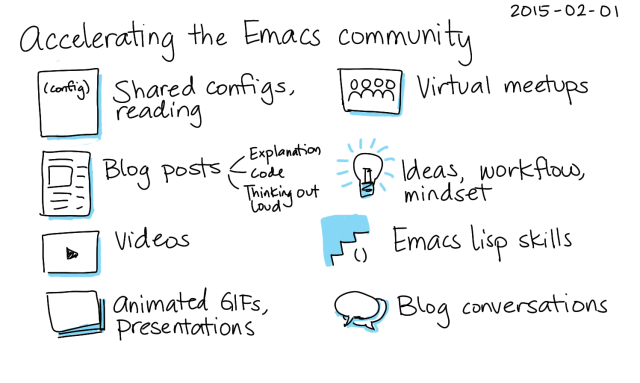
How can we get more people sharing their configs, or learning from other people's configs? How can we make it easier for people to share through blog posts, videos, animated GIFs, and presentations? How can we create spaces for people to connect, either with virtual meetups or in person? How can we swap interesting ideas, workflows, and mental habits? How can we improve our skills? How can we keep the conversation going?
Mm. Figuring out how to do virtual conferences might be a good start. Also, I've got this idea noodling around in my head on having some kind of an intermediate/advanced Org Mode workshop: something that covers clocking workflows, table calculations, literate programming, data analysis, publishing. Figuring out how to do virtual workshops would be awesome too.
Okay. First things first. Some kind of date and some kind of time, and some kind of help sorting out a schedule. August 8 and/or August 15, maybe? If librarians can hold an online conference through Google Hangouts, we should be able to figure this out too. (Librarians are super-cool!) If you have lots of experience in organizing virtual conferences or you have ideas for how to make this less intimidating for a non-organizer-y introvert, I'd love to hear from you in the comments or at sacha@sachachua.com. Let's make this happen!

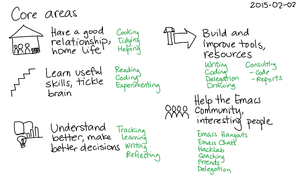
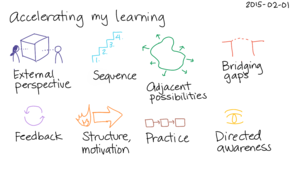
18 comments
Phillip Lord
2015-02-09T16:51:52ZOne idea that that I have wanted to try for ages was a conference that was not just virtual but asynchronous. This would help to get around the problem of timezones.
My original idea was for an academic conference, but I think it would work for an Emacs conference as well. The idea would be to combine mailing lists, IRC and screencasts or blogs together.
The schedule would be published in advance (and spread around the worlds timezones). Slowly over the course of a week, a new blog/screencast/live chat would be published; an annoucement would go to a special purpose mailing list/IRC. People could ask questions, over the new few days. Topics would overlap. But critically, the "presenters" would not been to be in the same timezone as the "audience".
I named this a "NearCon" (nearly a conference) when I first blogged about it... http://www.russet.org.uk/bl... But I've never got around to trying it. Strikes me, it would work well for Emacs -- people are geographically distributed, and for few of us is it a job.
sachac
2015-02-09T20:06:59ZI like that idea too. In fact, collecting questions before the screencast might be an interesting way to shape the presentation. If we start with loosely-defined topics (ex: "Automated testing", "Becoming an intermediate user") and let people submit, organize, and vote on questions that are well-suited for the format of a presentation, then someone might volunteer to cover a set of those questions in a short talk/demo. Hmm...
I definitely expect questions to come up (and ideally be answered) on an ongoing basis, since the videos will be there after all. =)
Phillip Lord
2015-02-10T09:42:34ZWell, we could start a repo on gitorious, with a set of Org files. People can contribute questions and subjects that they would like contributed. People could add proposed contributions, which could be written (a blogpost), recorded, screencast or something live. Then they add a time when they are free to release/give the material. Finally, we build an agenda over a week or two, set up a mailing list, IRC channel and away we go.
We could even release the agenda as an Emacs package -- install and you get the org files, which we can generate HTML from and view in EWW. And a set of events in the calendar.
The organisation would then be limited to compiling the agenda, and writing some "how-to" files for the repo.
Sam Flint
2015-02-09T22:49:34ZCareful, Stallman has issues with Hangouts, and Skype. And he should definitely be a part of it.
Mike
2015-02-10T10:51:42ZI disagree with “he should definitely be a part of it.” He has not been an Emacs maintainer for years, and his messages to emacs-devel resemble “troll” more closely than they resemble “meaningful and appropriate discussion,” Quoting from a recent Slashdot thread: “Richard Stallman needs to be brought up to spec on what computers are capable of. He's still living in a world where he doesn't experience even a small fraction of what technology has allowed. If we don't update his firmware soon, he's likely to become completely irrelevant within the decade. Unfortunately, I'm beginning to feel that decade may have already passed.”
sachac
2015-02-10T12:56:13ZI have no qualms about optimizing for ease of implementation rather than universal access, along the lines of it being better that Something Happens instead of waiting until we have a 100% solution. So, for example, I'd be fine with using Google Hangouts On Air to do video streaming even if some people are philosophically opposed to Google. People can always organize alternatives, and the more, the merrier. =)
Phillip Lord
2015-02-10T13:38:31ZI doubt that it's an issue to be honest. If we have a "multi-modal" approach, people can contribute in anyway that they choose.
Rainer M Krug
2015-02-10T09:57:06ZIn addition to organising a virtual conference, I would suggest to organise local focal points, where participats can meet in person in local venues of the same emacs conference - in other words: the conference is not only virtual, but consists of many venues where participants meet, join, give presentations which are broadcast to the other venues and can also joinded by anybody else. So one could have the best of both worlds - and also over different tie zones - imagine a 24 hour non-stop emacs meeting.
Tyler Smith
2015-02-11T14:03:11ZI like this. It would have the added benefit of introducing people to their local Emacs peers. I'd love to have a mini-conference in Ottawa concurrent with the virtual conference.
punchagan
2015-02-21T12:12:09ZThis is a great idea! If people feel inspired, they could follow up the conference with a hackathon.
Mike
2015-02-10T10:54:26ZIf this comes together, I could probably put something together on Org mode. I have a setup likely as complicated as (and certainly inspired by) Bernt Hansen’s that I've never posted, blogged about, etc. (Because I never felt it “ready enough”).
Austin Walker
2015-02-10T17:22:16ZI just started using Emacs a few months ago. If not for the fact that it's such an amazing tool, I would stick around just because the community is so awesome. It seems like what this idea needs is a website that we can point people to. Maybe we can take advantage of Github pages? A static site that everyone can contribute to with a pull request. Free hosting is also a nice thing.
sachac
2015-02-11T00:30:00ZGithubbed! https://github.com/sachac/e...
Andreas H.
2015-02-10T17:22:49ZRegarding the videoconferencing logistics: Doesn't Google Hangouts have a limitation on the number of participants?
I just came across https://jitsi.org/Projects/..., which is open source software, and looks pretty neat, except that it doesn't work with Firefox. I'll be looking into this technology anyways over the next weeks, and can keep you updated.
sachac
2015-02-11T00:30:58ZThere's a limit of 10 people in the Hangout (broadcast audio/video), but any number of people can listen to the stream and submit questions through the Q&A app (or through IRC, comments, etc.), so it will work quite well with 1-3 speakers and one facilitator who can monitor the Q&A for questions.
Martin Stendorf
2015-02-11T09:24:41ZSacha this is an awesome idea, and i would like to take this opportunity to thank you for what you are doing for the emacs community in general.
I can't stress enough how many years ahead with emacs your blog, emacs chats and stuff have boosted my emacs knowledge.
Sadly I do not have much experience with organizing this stuff, although I would attend with great interest, I probably do not have much insight to bring to the table.
Still I'm willing to help out with whatever I can, just reach out - would like to see this happen! :)
Tarmo Aidantausta
2015-02-11T20:29:50ZI love the idea and will definitely show up! It would be awesome if people would just share their configs on github or some other public repo so one could read and learn from them.
I recently started my config from scratch with the idea it would easy to approach for someone who doesn't know anything about emacs by making it modular. By splitting it up to different parts based on some categories, like languages, appearance and so forth. Some of them I stole from emacsrocks dudes .emacs.d and some from Sam Aarons Emacs-live. Then I'm using cask to install packages, so it makes easy to see which ones I'm using. Then I name the configs based on the packages as well.
I would love to learn more elisp, but have been a bit lazy on that aspect. And I'm just spitballing here, but one of the outcomes of the conference could be to compile some interactive learning material for elisp or resources for it...?
Ryan White
2015-02-12T08:29:55ZFantastic idea Sacha! I'd be happy to lurk and sponge all knowledge I can - not sure if I have much to contribute, but I like the idea of a definite timeframe - even if it's just a stake in the ground at this point. RE hangouts/accessibility and all that - I remember Nic Ferrier built some sort of team collaboration/video conferencing thing - a server running in Emacs, if I remember correctly. Maybe he could get something going for the conference?